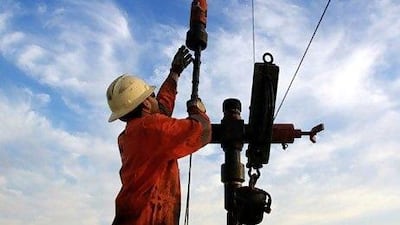The first GCC country to discover oil is now the first to encounter the economic and political challenges of energy vulnerability.
Bahrain started the Gulf boom when the forerunner of today's Chevron struck oil there in 1932. In those days, Bahrain was politically dependent on Britain, and Chevron could deal with the ruler only through the resident British representative.
In 1958, Bahrain agreed to surrender to Saudi Arabia its claim to the Fasht Abu Safa offshore area in return for half of the revenue from the oilfield there. From the mid-1970s, it nationalised its own oilfield, but production dropped steadily.
The Lebanese civil war allowed Bahrain to embark on economic diversification and emerge as the banking centre of the Middle East. Petroleum is now about a quarter of GDP, more than in Dubai where it has now fallen below 5 per cent, but less than Abu Dhabi where oil is half the economy.
But if the economy has diversified, the state budget has not. Oil and gas earnings, 70 per cent of which come from Abu Safa, make up 90 per cent of government revenue. Since the field is operated by Aramco, the Saudi state oil company, Bahrain has no choice but to accept whatever Riyadh decides to assign to it. During the period of low oil prices from 1996, the Saudis allocated all of the field's revenue to Bahrain but reverted to half when they expanded capacity in 2004.
Bahrain plans to rejuvenate its own oil production and exploit large resources of difficult "tight" gas deep beneath the island, in partnership with Occidental and Mubadala Development, a strategic investment company owned by the Abu Dhabi Government. Yet even if these plans succeed, the extra earnings will still fall short of the revenue from Abu Safa by about US$1 billion (Dh3.67bn) a year.
New gas will be more expensive, whether imported or produced from Bahrain's own more technically challenging reservoirs. The Saudis reportedly discouraged Bahraini plans to buy Qatari gas.
From 2008, Bahrain discussed gas imports from Iran, but these were stymied by Iran's slow negotiating pace and a wide gap in price expectations. As usual, Iran missed the strategic window to project influence via its energy resources.
Last May, Sheikh Khalid bin Ahmed bin Mohammed Al Khalifa, Bahrain's foreign affairs minister, announced "the project to import Iranian gas is currently halted because of the blatant Iranian interference" in Bahrain's domestic affairs.
Bahrain's model is based on minimal taxation, good infrastructure and living conditions, attracting financial services and tourism, and luring industry with low energy prices. The continuing political turmoil is only accelerating the long-standing flight of businesses to the new centres in Dubai, Abu Dhabi and Doha.
So without Saudi largesse, the government would be fiscally unsustainable, unable to continue providing benefits to the national population. More oil and gas production partly alleviates budget constraints, but also postpones the post-oil economy. This circumscribes the freedom of action of any Bahraini government in dealing with political conflict.
The first rule of energy security is to create mutual dependence. But the Manama-Riyadh axis runs only one way. Saudis need Bahrain only as a place to shop and let off steam.
The second rule is that, as Churchill put it: "On no one country, on no one route, and on no one field must we be dependent". Yet for Bahrain, this dependence is pretty much unavoidable, given the government's antipathy to Iran.
Even petro-states can be energy-insecure. Bahrain is a unique case, but it is a useful reminder of the need for oil-producing countries to pursue diversification - of energy sources, of their economies and of partners.
*Robin Mills is the head of consulting at Manaar Energy, and the author of The Myth of the Oil Crisis and Capturing Carbon
twitter: Follow and share our breaking business news. Follow us


